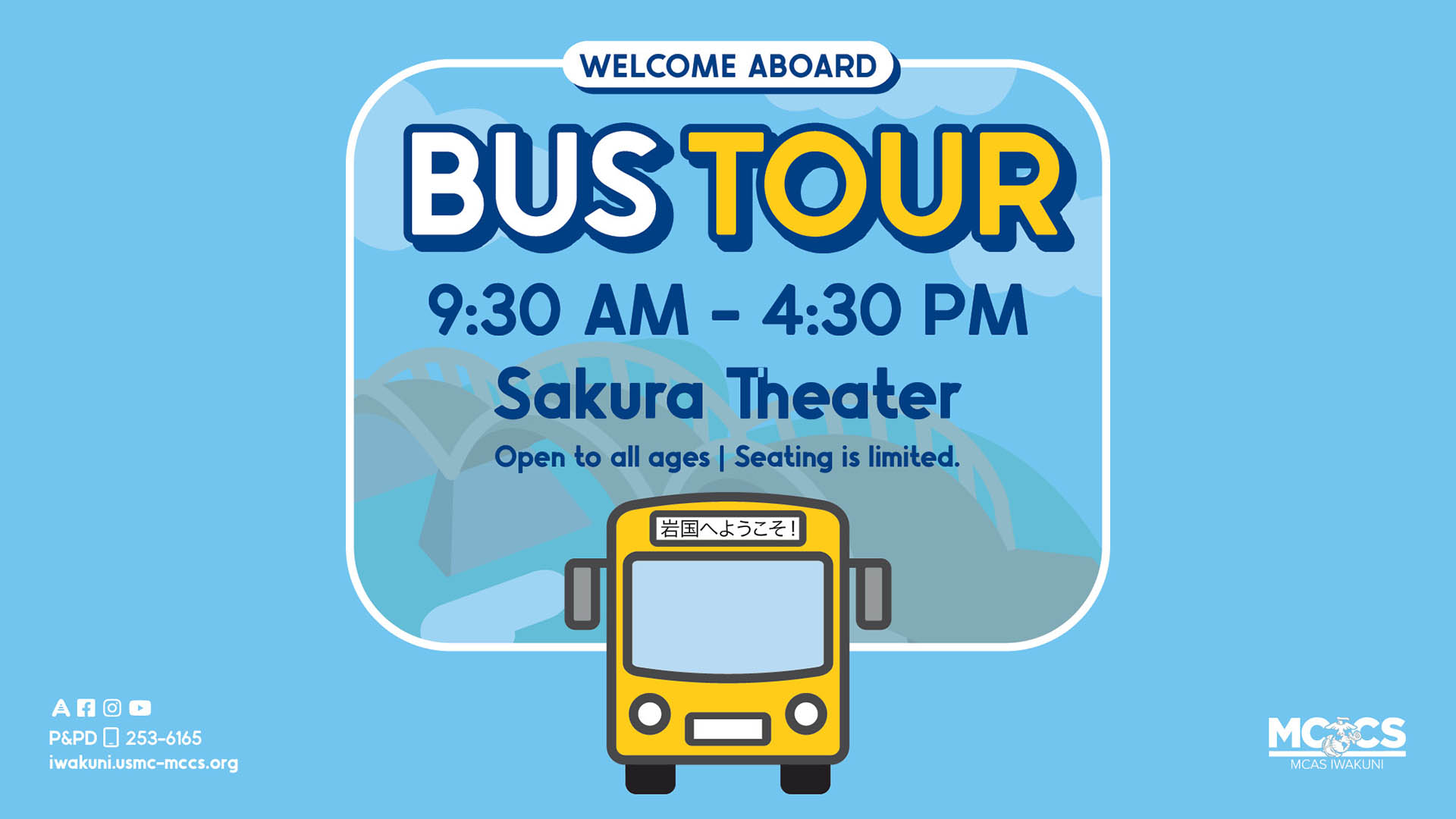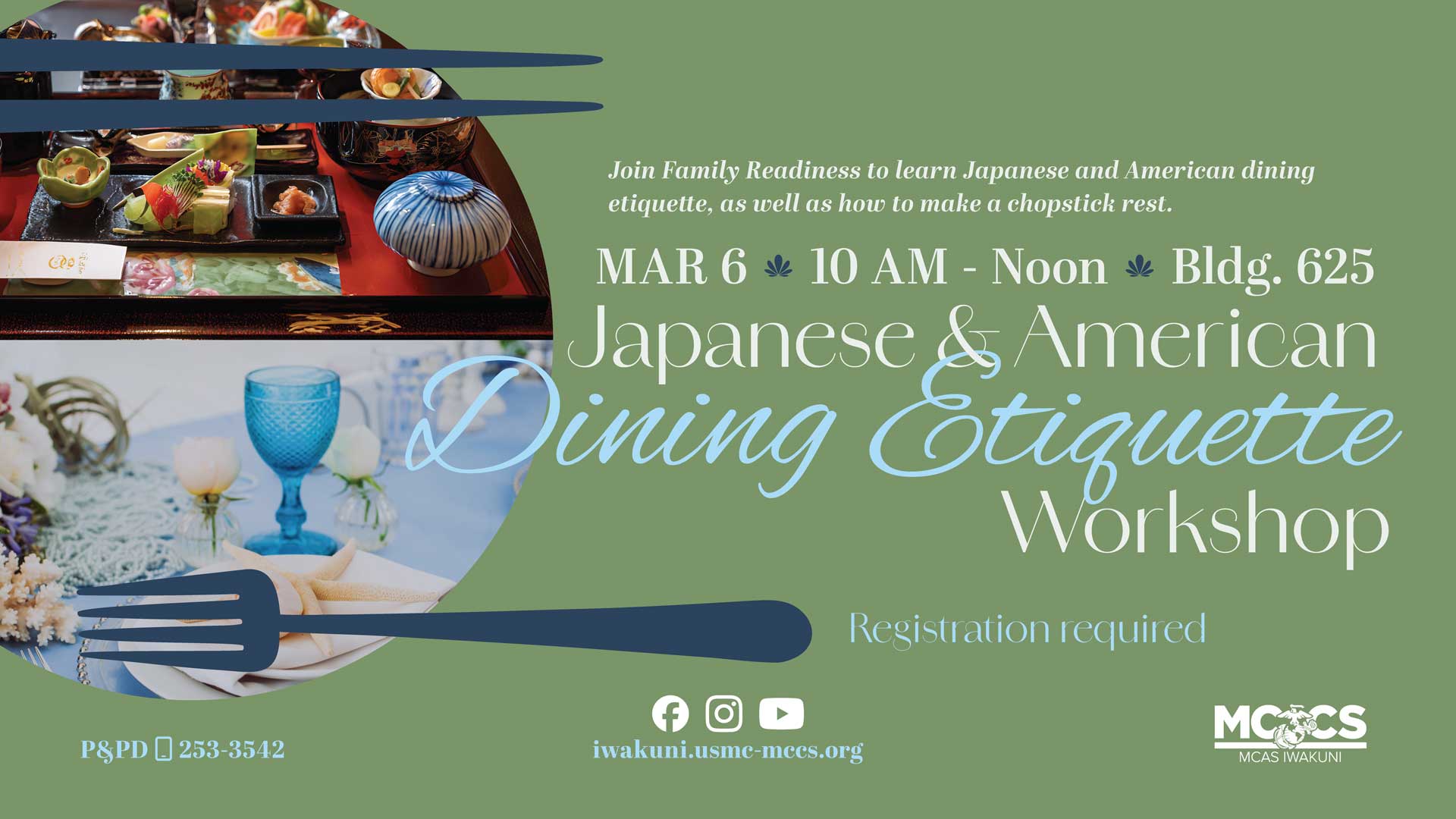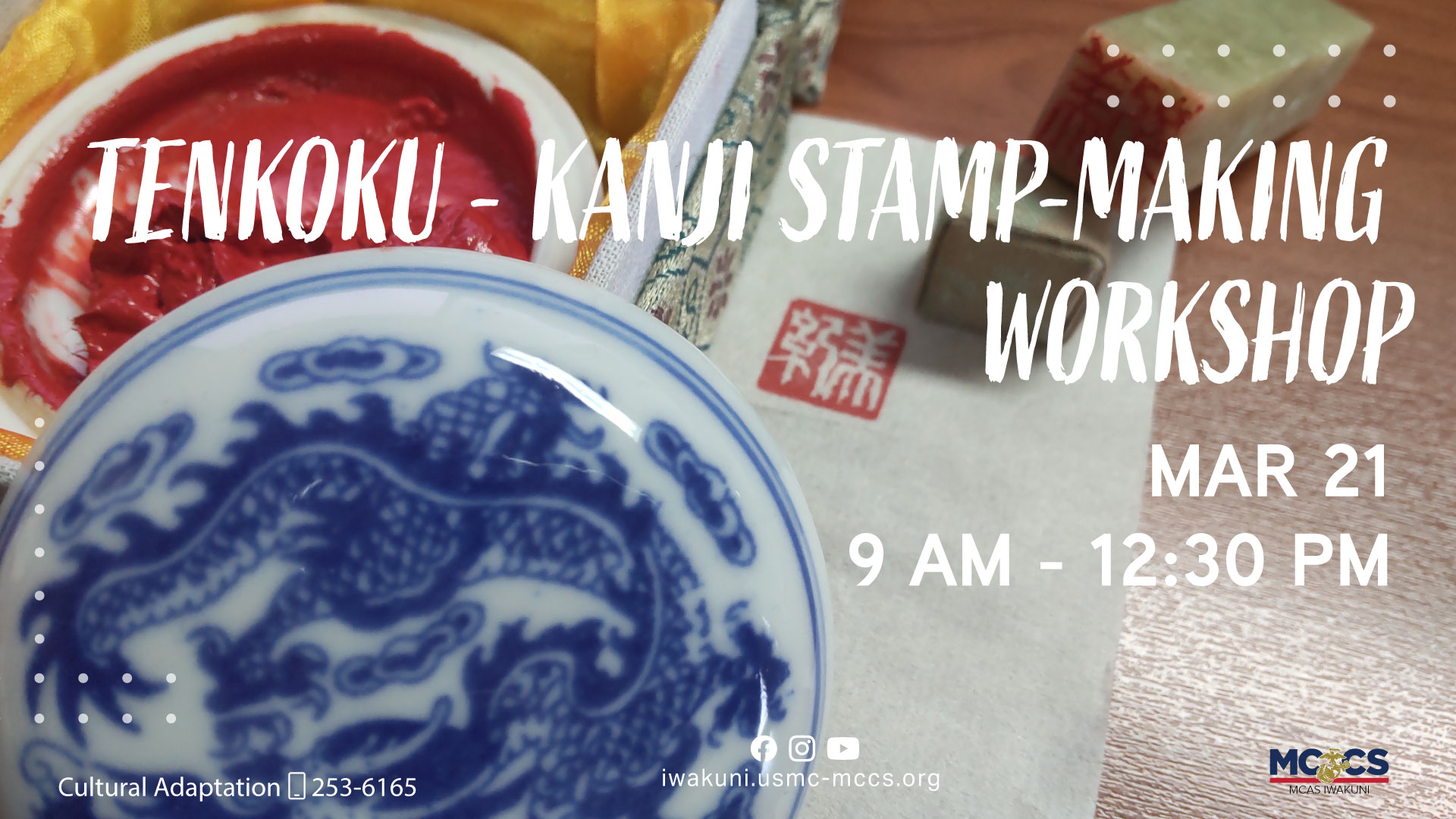Local Area Information
On this page:
On this page:
Upcoming Events
Mar
4

Welcome Aboard Bus Tour
09:30am - 04:30pm
Location: Sakura Theater
Mar
6

Japanese and American Dining Etiquette Workshop
10:00am - 12:00pm
Location: Bldg. 625
Mar
11

Welcome Aboard Bus Tour
09:30am - 04:30pm
Location: Sakura Theater
Mar
18

Welcome Aboard Bus Tour
09:30am - 04:30pm
Location: Sakura Theater
Mar
21

Tenkoku Stamp Making Workshop
09:00am - 12:30pm
Location: Bldg. 411
Mar
25

Welcome Aboard Bus Tour
09:30am - 04:30pm
Location: Sakura Theater
Cultural & Relocation Programs & Services
Relocating to MCAS Iwakuni is a major milestone in your career and personal life. MCCS programs are with you every step of the way, from the day you receive your orders to the day you leave. See what Cultural & Relocation Programs & Services we offer.
Programs are available to assist newcomers, and newcomers will need them at some point.
Our Information and Referrals section is filled with information to help you find your way around locally and throughout Japan. The Information and Referral staff are available to assist you with any questions you have about, well, anything!
Cultural Adaptation will help you with the final stage of acclimating to your new duty station. From language to public transportation, you will find your time here much more rewarding if you try to adapt.
Japan is a country full of traditions, culture, and beauty. Its history stretches back thousands of years and many of the more colorful eras are still alive and ready to be explored. Get out and see what fascinating experiences await you!
Cultural & Relocation Services
Follow Us:
Resource Downloads
Resource Links
New to Iwakuni
Iwakuni, which translates to “rock country,” is a sprawling city that encompasses 337 square miles of beaches, small bays, countryside and clusters of small mountains. The American population, much of it living aboard the Air Station, and the 140,000+ locals, comprise Iwakuni’s unique culture. Whatever Japanese experience you are looking for, Iwakuni will show it to you.
The city belongs to Yamaguchi prefecture that makes up the Western end of Honshu, Japan’s largest island. Being stationed in Iwakuni is ideal for traveling as Kyushu and Shikoku islands are feasible day trips by car. And getting in and out of town is ultra convenient with Iwakuni Kintaikyo airport located right outside the gate! The Shinkansen bullet train stops at Shin Iwakuni Station, making travel throughout Japan a breeze.
One of Iwakuni City’s primary borders is the Seto Inland Sea. A drive or bike ride along the roads hugging the coastline make for scenic day trips. On clear days, many nearby islands are visible. Most tourists make a day trip from nearby Hiroshima or Miyajima via train to see the Kintai Bridge and Iwakuni Castle, but locals know that there is so much more to do here.
It’s true that there is a strong industrial presence within central Iwakuni comprised of paper, refined oil, and textile manufacturers. But much of the city is scenic waterfront, uncountable rivers and streams, Lotus and rice paddies and forests. There are beaches and hiking trails that are reachable by train or bus. A quick drive can transport you to another island, a bamboo forest, temples, world heritage sights or several large cities.
MCAS Iwakuni occupies a delta comprised of land that was reclaimed by a feudal lord roughly four hundred years ago. The Japanese government commissioned a base here in 1940, and it became a training and defense air station as well as housing Etajima Naval Academy. After being occupied by multiple countries, it became a US Military Base in 1952. Currently, the base population is comprised of roughly 5,500 active duty, family members and civilian employees.
MCCS programs and professionals are here to support you and are committed to making your tour in Iwakuni adventurous, successful and most of all, memorable.
EMERGENCY
Japanese Response
Non-Emergency
BASE OPERATOR
BRANCH HEALTH CLINIC
CHAPLAIN
PMO
RED CROSS
VETERINARIAN
DSN lines with prefix 253 may be reached from a cellphone by calling 0827-79-XXXX.
DSN lines with prefix 255 may be reached from a cellphone by calling 0827-94-XXXX.
INTERNATIONAL CALLING
To call the US from a long distance accessible land-line, dial 96001 + (country code, 1 for US) + (area code) + (number).
To call MCAS Iwakuni from a US Landline (253/255): 011-81-827-79/94-XXXX (the last four digits of your number).
Your US cell phone dialed from Japan: 011-81-XX-XXXX-XXXX
Cultural Adaptation
A whole new world opens up when you begin to understand the Japanese language, culture and customs. From little things like ordering at a restaurant to extended travel around the country, get the most from your overseas assignment by learning about your host nation.
Hours of operation:
| MON - FRI | 7:30 AM - 4:30 PM |
Moving to Japan and having a satisfying tour begins with a positive attitude, open mind and an understanding of the basics in Japanese customs and culture. Here are some of the more important things to know about your new host country.
Public Transportation
Many Japanese rely on public transportation as their sole source of getting around. This is a venue where Japan’s reputation as a polite society is best illustrated. Etiquette while using public transportation is pretty simple: just be respectful of others. Don’t eat, drink, talk on your mobile device or have a loud conversation. Buses and trains have reserved seating for the elderly, pregnant, disabled or parents carrying young children. If you should see one of them without a seat, you should stand up and offer your seat.
Tipping
This is less of a culture shock and more of a culture perk. Tipping is almost never expected in Japan, especially in restaurants.
Cash is King
Always carry extra Yen when going off-base. Some larger chains of restaurants and grocery stores accept credit card, but some do not. Personal checks are foreign to most Japanese and off-base rentals are paid via bank transactions or in cash. Utility bills are usually paid in cash at convenience stores or bank transactions. ATM cards issued at banks aboard MCAS Iwakuni can be used to withdraw Yen at 7-11 stores and off-base post office ATMs.
Not One Drop
Remember, not one drop if you're driving! Japan has very strict legal limits and severe punishments for driving under the influence. Don't risk it, do not have a single drop if you are driving.
Time Zones
Many of us are nearly half a world away from friends and family back in the states, and while the distance is vast, modern technology has made it pretty easy to keep in touch. Email, video conferencing and internet phones are great tools to maintain that contact, but figuring out what time it is back home can be tricky.
Japan is close to the International Date Line; roughly a day ahead of the U.S. Japan and does not observe Daylight Savings Time (DST). To figure out the time difference, add Japan’s UTC (Coordinated Universal Time) +9 to the desired time zone’s (adjusting for DST if needed) and count back that many hours from the current time.
Japanese Alphabet
The modern Japanese writing system uses three main scripts: Kanji, Hiragana and Katakana. Romanized Japanese, called rōmaji, is frequently used to spell out Japanese words with the English alphabet sounds. Visit Cultural Adaptation or Information Referral today to see about learning the Japanese alphabets.

Good afternoon
Kon nichi wa

Good evening
Kon ban wa

Nice to meet you
Hajime mashite

Have a nice day
Yoi ichinichi wo

How are you
(O) genki des ka?

I am fine
Genki desu

Excuse me / Pardon
Sumimasen

Are you okay?
Die joubu?

What time is it?
Nanji deska?

What is your name?
O na-mae wa non deska?

My name is _____.
Watashi no namae wa _____ des.

Yes / No
Hai / Iie

Good night
O yasumi nasai

Good bye
Sayonara

See ya!
Mata ne

Please
O negai shimasu

Thank you
Arigatou

You are welcome
Dou itashimashite

I am (really) sorry
Gomen nasai

Go ahead / After you
Dozo

I am American
Watashi wa Americajin desu

Can you speak English?
Eigo ga dekimasu ka?

I don't understand Japanese
Nihongo ga wakarimasen

Do you understand?
Wakarimasu ka?

I understand
Wakarimasu